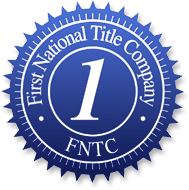Why Do You Need Title Insurance?
First of all, you may ask the question, “What is title insurance?” The natural follow up question is “Why do I need title insurance?” Whether you’re a buyer or seller, title insurance is all about peace of mind and a way to protect yourself during your transaction. Read further to learn more…
What is Title Insurance?
Title insurance is actually a process, with the insurance policy being the end product. This process starts with a comprehensive search of public records to determine if any liens or other encumbrances are attached to the real estate. During the search, detailed information from potentially hundreds of sources is gathered and reviewed, including tax records, federal, state and local records, court judgments, deeds and an evaluation of whether the property characteristics are accurately reflected by the information on the title to the real estate. Not surprisingly, one in four title searches uncover some issue that must be resolved prior to the real estate closing.
What Kind of Issues?
There are four primary categories that can cloud a title and result in significant risk for a prospective homebuyer or lender. The title search meticulously seeks out and evaluates any known indication of any of these issues; however, even the most comprehensive search may not uncover every hidden area of title risk:
1 Liens can be placed against a title by any party with an unpaid financial obligation against the property owner. The nature of these claims can be everything from unpaid child support or alimony to unpaid POA dues, taxes or bills from contractors like carpenters or electricians.
2 Errors may have occurred during the course of previous ownership changes that could have included recording errors, typographical errors, incorrect legal descriptions, incorrect indexing of land records or title search errors resulting from undisclosed issues like unsatisfied claims not shown in the public record.
3 Claims against a property may come from missing heirs or heirs born after the execution of a will, the dower or courtesy rights of spouses of former owners, claims from ex-spouses or even from government or corporate entities. They can also arise when the mental competence of a grantor of a deed is called into question; when wills are not properly probated or are misinterpreted; when a title was transferred by a minor; or when a grantor of a deed did so while under undue influence.
4 Fraudulent activity such as forged signatures or fraud in the execution of documents, the use of false powers of attorney in the execution of documents, false impersonation by someone claiming to be the owner of the property or any other fraudulent activity can invalidate title work that occurred from that point on.
Prudent buyers and their respective realtors should assist in making sure all issues that come to light from the title search are appropriately resolved prior to the closing.
What Does Title Insurance Cover?
Once the title search has been concluded and work has been completed to cure any potential issues, title insurance can then be issued. The title insurance policy protects policy owners against financial losses associated with claims against the real estate that were not discovered during the title search process. It also insures against the title being rejected by the subsequent buyer of the property due to pre-existing title defects and covers losses that may arise after the property is sold if title covenants were included in the sales contract. This includes attorney fees and costs associated with defending the title and insures that the policy holder is the legal owner and has access to the property. Since the final title insurance policy may have some coverage exceptions (such as conditions, utility and other easements or set-back requirements), policy owners must carefully read the coverage information for their specific policy provisions.
Who is Covered by Title Insurance?
There are two different kinds of title insurance policies, and each covers a specific type of policy owner:
Loan title policies and Owner’s title policies cover many of the same things. In both cases, the policy holders are protected from title risks such as search errors, claims by missing heirs or ex-spouses, forged signatures in the chain of title and many other title problems that could go undetected before the closing. Attorney fees and settlement costs are also covered up to the policy’s limit.
First National Title Company offers Title Insurance policies that will fit your needs. For more information, please contact us on our website or call (501) 221-0101 for Central Arkansas or call one of our local branches listed below
 First National Title Company has been verified by a 3rd Party, Erwin & Co., to be in compliance with ALTA Best Practices. Click the ALTA logo to see the Erwin & Co. report.
First National Title Company has been verified by a 3rd Party, Erwin & Co., to be in compliance with ALTA Best Practices. Click the ALTA logo to see the Erwin & Co. report.
